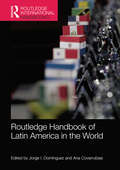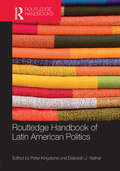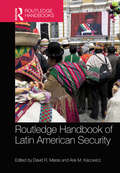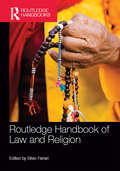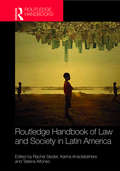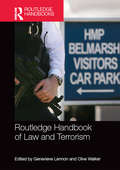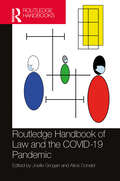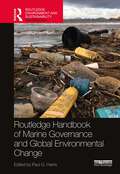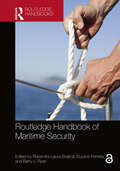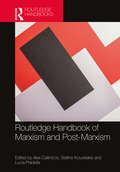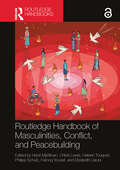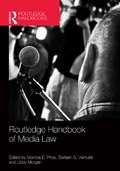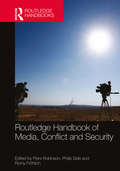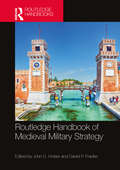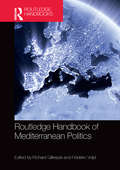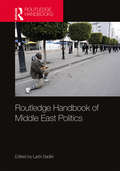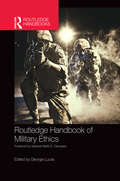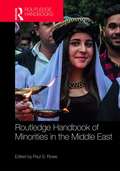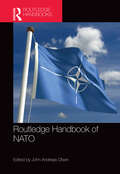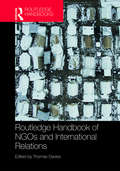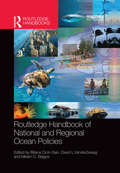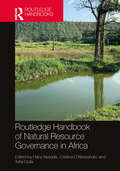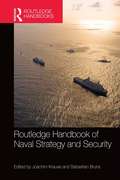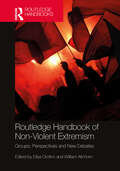- Table View
- List View
Routledge Handbook of Latin America in the World
by Jorge I. Domínguez and Ana CovarrubiasThe Handbook of Latin America in the World explains how the Latin American countries have both reacted and contributed to changing international dynamics over the last 30 years. It provides a comprehensive picture of Latin America’s global engagement by looking at specific processes and issues that link governments and other actors, social and economic, within the region and beyond. Leading scholars offer an up-to-date state of the field, theoretically and empirically, thus avoiding a narrow descriptive approach. The Handbook includes a section on theoretical approaches that analyze Latin America’s place in the international political and economic system and its foreign policy making. Other sections focus on the main countries, actors, and issues in Latin America’s international relations. In so doing, the book sheds light on the complexity of the international relations of selected countries, and on their efforts to act multilaterally. The Routledge Handbook of Latin America in the World is a must-have reference for academics, researchers, and students in the fields of Latin American politics, international relations, and area specialists of all regions of the world.
Routledge Handbook of Latin American Politics
by Peter Kingstone Deborah J. YasharLatin America has been one of the critical areas in the study of comparative politics. The region’s experiments with installing and deepening democracy and promoting alternative modes of economic development have generated intriguing and enduring empirical puzzles. In turn, Latin America’s challenges continue to spawn original and vital work on central questions in comparative politics: about the origins of democracy; about the relationship between state and society; about the nature of citizenship; about the balance between state and market. The richness and diversity of the study of Latin American politics makes it hard to stay abreast of the developments in the many sub-literatures of the field. The Routledge Handbook of Latin American Politics offers an intellectually rigorous overview of the state of the field and a thoughtful guide to the direction of future scholarship. Kingstone and Yashar bring together the leading figures in the study of Latin America to present extensive empirical coverage, new original research, and a cutting-edge examination of the central areas of inquiry in the region.
Routledge Handbook of Latin American Security
by Arie M. Kacowicz David R. MaresThis new Handbook is a comprehensive collection of cutting-edge essays on all aspects of Latin American Security by a mix of established and emerging scholars. The Routledge Handbook of Latin American Security identifies the key contemporary topics of research and debate, taking into account that the study of Latin America’s comparative and international politics has undergone dramatic changes since the end of the Cold War, the return of democracy and the re-legitimization and re-armament of the military against the background of low-level uses of force short of war. Latin America’s security issues have become an important topic in international relations and Latin American studies. This Handbook sets a rigorous agenda for future research and is organised into five key parts: • The Evolution of Security in Latin America • Theoretical Approaches to Security in Latin America • Different 'Securities' • Contemporary Regional Security Challenges • Latin America and Contemporary International Security Challenges With a focus on contemporary challenges and the failures of regional institutions to eliminate the threat of the use of force among Latin Americans, this Handbook will be of great interest to students of Latin American politics, security studies, war and conflict studies and International Relations in general.
Routledge Handbook of Law and Religion
by Silvio FerrariThe field of law and religion studies has undergone a profound transformation over the last thirty years, looking beyond traditional relationships between State and religious communities to include rights of religious liberty and the role of religion in the public space. This handbook features new, specially commissioned papers by a range of eminent scholars that offer a comprehensive overview of the field of law and religion. The book takes on an interdisciplinary approach, drawing from anthropology, sociology, theology and political science in order to explore how laws and court decisions concerning religion contribute to the shape of the public space. Key themes within the book include: Religions symbols in the public space; Religion and security; Freedom of religion and cultural rights; Defamation and hate speech; Gender, religion and law; This advanced level reference work is essential reading for students, researchers and scholars of law and religion, as well as policy makers in the field.
Routledge Handbook of Law and Society in Latin America
by Rachel Sieder Karina Ansolabehere Tatiana A. Alfonso SierraAn understanding of law and its efficacy in Latin America demands concepts distinct from the hegemonic notions of "rule of law" which have dominated debates on law, politics and society, and that recognize the diversity of situations and contexts characterizing the region. The Routledge Handbook of Law and Society in Latin America presents cutting-edge analysis of the central theoretical and applied areas of enquiry in socio-legal studies in the region by leading figures in the study of law and society from Latin America, North America and Europe. Contributors argue that scholarship about Latin America has made vital contributions to longstanding and emerging theoretical and methodological debates on the relationship between law and society. Key topics examined include: The gap between law-on-the-books and law in action The implications of legal pluralism and legal globalization The legacies of experiences of transitional justice Emerging forms of socio-legal and political mobilization Debates concerning the relationship between the legal and the illegal. The Routledge Handbook of Law and Society in Latin America sets out new research agendas for cross-disciplinary socio-legal studies and will be of interest to those studying law, sociology of law, comparative Latin American politics, legal anthropology and development studies.
Routledge Handbook of Law and Terrorism
by Clive Walker Genevieve LennonIn the years since 9/11, counter-terrorism law and policy has proliferated across the world. This handbook comprehensively surveys how the law has been deployed in all aspects of counter-terrorism. It provides an authoritative and critical analysis of counter-terrorism laws in domestic jurisdictions, taking a comparative approach to a range of jurisdictions, especially the UK, the US, Australia, Canada, and Europe. The contributions to the book are written by experts in the field of terrorism law and policy, allowing for discussion of a wide range of regulatory responses and strategies of governance. The book is divided into four parts, reflective of established counter-terrorism strategic approaches, and covers key themes such as: Policing and special powers, including surveillance Criminal offences and court processes Prevention of radicalisation and manifestations of extremism Protective/preparative security The penology of terrorism In addressing counter-terrorism laws across a broad range of topics and jurisdictions, the handbook will be of great interest and use to researchers, students and practitioners in criminal law, counter-terrorism, and security studies.
Routledge Handbook of Law and the COVID-19 Pandemic (Routledge Handbooks in Law)
by Joelle Grogan and Alice DonaldThe COVID-19 pandemic not only ravaged human bodies but also had profound and possibly enduring effects on the health of political and legal systems, economies and societies. Almost overnight, governments imposed the severest restrictions in modern times on rights and freedoms, elections, parliaments and courts. Legal and political institutions struggled to adapt, creating a catalyst for democratic decline and catastrophic increases in poverty and inequality. This handbook analyses the global pandemic response through five themes: governance and democracy; human rights; the rule of law; science, public trust and decision making; and states of emergency and exception. Containing 12 thematic commentaries and 25 chapters on countries of diverse size, wealth and experience of COVID-19, it represents the combined effort of more than 50 contributors, including leading scholars and rising voices in the fields of constitutional, international, public health, human rights and comparative law, as well as political science, and science and technology studies. Taking stock after the onset of global emergency, this book provides essential analysis for politicians, policy-makers, jurists, civil society organisations, academics, students and practitioners at both national and international level on the best, and most concerning, practices adopted in response to COVID-19 – and key insights into how states and multilateral institutions should reform, adapt and prepare for future emergencies.
Routledge Handbook of Marine Governance and Global Environmental Change (Routledge Environment and Sustainability Handbooks)
by Paul G. HarrisThis comprehensive handbook provides a detailed and unique overview of current thinking about marine governance in the context of global environmental change. Many of the most profound impacts of global environmental change, and climate change in particular, will occur in the oceans. It is vital that we consider the role of marine governance in adapting to and mitigating these impacts. This comprehensive handbook provides a thorough review of current thinking about marine environmental governance, including law and policy, in the context of global environmental change. Initial chapters describe international law, regimes, and leadership in marine environmental governance, in the process considering how existing regimes for climate change and the oceans should and can be coordinated. This is followed by an exploration of the role of non-state actors, including scientists, nongovernmental organisations, and corporations. The next section includes a collection of chapters highlighting governance schemes in a variety of marine environments and regions, including coastlines, islands, coral reefs, the open ocean, and regional seas. Subsequent chapters examine emerging issues in marine governance, including plastic pollution, maritime transport, sustainable development, environmental justice, and human rights. Providing a definitive overview, the Routledge Handbook of Marine Governance and Global Environmental Change is suitable for advanced students in marine and environmental governance, environmental law and policy, and climate change, as well as practitioners, activists, stakeholders, and others concerned about the world’s oceans and seas.
Routledge Handbook of Maritime Security
by Susana Ferreira Barry J. Ryan Ruxandra-Laura BoşilcăThis handbook offers a critical and substantial analysis of maritime security and documents the most pressing strategic, economic, socio-cultural and legal questions surrounding it. Written by leading international experts, this comprehensive volume presents a wide variety of theoretical positions on maritime security, detailing its achievements and outlining outstanding issues faced by those in the field. The book includes studies which cover the entire spectrum of activity along which maritime security is developing, including, piracy, cyber security, energy security, terrorism, narco-subs and illegal fishing. Demonstrating the transformative character and potential of the topic, the book is divided into two parts. The first part exhibits a range of perspectives and new approaches to maritime security, and the second explores emerging developments in the practice of security at sea, as well as regional studies written by local maritime security experts. Taken together, these contributions provide a compelling account of the evolving maritime security environment, casting fresh light on theoretical and empirical aspects.The book will be of much interest to practitioners and students of maritime security, naval studies, security studies, maritime history, and International Relations in general.
Routledge Handbook of Maritime Security
by Ruxandra-Laura BoşilcăThis handbook offers a critical and substantial analysis of maritime security and documents the most pressing strategic, economic, socio-cultural and legal questions surrounding it. Written by leading international experts, this comprehensive volume presents a wide variety of theoretical positions on maritime security, detailing its achievements and outlining outstanding issues faced by those in the field. The book includes studies which cover the entire spectrum of activity along which maritime security is developing, including, piracy, cyber security, energy security, terrorism, narco-subs and illegal fishing. Demonstrating the transformative character and potential of the topic, the book is divided into two parts. The first part exhibits a range of perspectives and new approaches to maritime security, and the second explores emerging developments in the practice of security at sea, as well as regional studies written by local maritime security experts. Taken together, these contributions provide a compelling account of the evolving maritime security environment, casting fresh light on theoretical and empirical aspects. The book will be of much interest to practitioners and students of maritime security, naval studies, security studies, maritime history, and International Relations in general.
Routledge Handbook of Marxism and Post-Marxism
by Alex Callinicos; Stathis Kouvelakis; Lucia PradellaIn the past two decades, Marxism has enjoyed a revitalization as a research program and a growth in its audience. This renaissance is connected to the revival of anti-capitalist contestation since the Seattle protests in 1999 and the impact of the global economic and financial crisis in 2007–8. It intersects with the emergence of Post-Marxism since the 1980s represented by thinkers such as Jürgen Habermas, Chantal Mouffe, Ranajit Guha and Alain Badiou. This handbook explores the development of Marxism and Post-Marxism, setting them in dialogue against a truly global backdrop. Transcending the disciplinary boundaries between philosophy, economics, politics and history, an international range of expert contributors guide the reader through the main varieties and preoccupations of Marxism and Post-Marxism. Through a series of framing and illustrative essays, readers will explore these traditions, starting from Marx and Engels themselves, through the thinkers of the Second and Third Internationals (Rosa Luxemburg, Lenin and Trotsky, among others), the Tricontinental, and Subaltern and Post-Colonial Studies, to more contemporary figures such as Huey Newton, Fredric Jameson, Judith Butler, Immanuel Wallerstein and Samir Amin. The Routledge Handbook of Marxism and Post-Marxism will be of interest to scholars and researchers of philosophy, cultural studies and theory, sociology, political economics and several areas of political science, including political theory, Marxism, political ideologies and critical theory.
Routledge Handbook of Masculinities, Conflict, and Peacebuilding
by Heleen Touquet Henri Myrttinen Farooq Yousaf Philipp Schulz Chloé Lewis Elizabeth LaruniThis handbook engages with and broadens current debates on men and masculinities in conflict and peacebuilding.Through an expansive range of chapters across a unique array of geographical settings, the volume shatters prevailing assumptions about men’s relationship to conflict and its wake. Situated across scholarship, policy, and practice, the contributions offer new possibilities for a more complex and complete picture of the gendered tapestries of conflict, peace, and the spaces in between. The handbook combines feminist, intersectional, relational, decolonial, and queer perspectives on the conceptualisation of masculinities in conflict and peacebuilding. This approach provides us with the tools to go beyond direct, physical, conflict-related violence to examine less visible forms of violence and power as well as other ways in which masculinities interact with conflict and peace. In doing so, the book permits a multi-faceted view of men’s roles, relationships, vulnerabilities, and non-violent agencies in conflict and peacebuilding across scholarship, policy, and practice.This book will be of much interest to students of gender, masculinities, peace and conflict studies, and international relations.Chapter 1, 3, 9, 13, and 30 of this book are freely available as a downloadable Open Access PDF at http://www.taylorfrancis.com under a Creative Commons Attribution-Non Commercial-No Derivatives (CC-BY-NC-ND) 4.0 license.Chapters 19 and 25 of this book is freely available as a downloadable Open Access PDF at http://www.taylorfrancis.com under a Creative Commons Attribution (CC-BY) 4.0 license.
Routledge Handbook of Media Law
by Monroe E. Price Stefaan Verhulst Libby MorganFeaturing specially commissioned chapters from experts in the field of media and communications law, this book provides an authoritative survey of media law from a comparative perspective. The handbook does not simply offer a synopsis of the state of affairs in media law jurisprudence, rather it provides a better understanding of the forces that generate media rules, norms, and standards against the background of major transformations in the way information is mediated as a result of democratization, economic development, cultural change, globalization and technological innovation. The book addresses a range of issues including: Media Law and Evolving Concepts of Democracy Network neutrality and traffic management Public Service Broadcasting in Europe Interception of Communication and Surveillance in Russia State secrets, leaks and the media A variety of rule-making institutions are considered, including administrative, and judicial entities within and outside government, but also entities such as associations and corporations that generate binding rules. The book assesses the emerging role of supranational economic and political groupings as well as non-Western models, such as China and India, where cultural attitudes toward media freedoms are often very different. Monroe E. Price is Director of the Center for Global Communication Studies at the Annenberg School for the University of Pennsylvania and Joseph and Sadie Danciger Professor of Law and Director of the Howard M. Squadron Program in Law, Media and Society at the Cardozo School of Law. Stefaan Verhulst is Chief of Research at the Markle Foundation. Previously he was the co-founder and co-director, with Professor Monroe Price, of the Programme in Comparative Media Law and Policy (PCMLP) at Oxford University, as well as senior research fellow at the Centre for Socio Legal Studies. Libby Morgan is the Associate Director of the Center for Global Communication Studies at the Annenberg School for the University of Pennsylvania.
Routledge Handbook of Media, Conflict and Security
by Philip Seib Piers Robinson Romy FrohlichThis Handbook links the growing body of media and conflict research with the field of security studies. The academic sub-field of media and conflict has developed and expanded greatly over the past two decades. Operating across a diverse range of academic disciplines, academics are studying the impact the media has on governments pursuing war, responses to humanitarian crises and violent political struggles, and the role of the media as a facilitator of, and a threat to, both peace building and conflict prevention. This handbook seeks to consolidate existing knowledge by linking the body of conflict and media studies with work in security studies. The handbook is arranged into five parts: Theory and Principles. Media, the State and War Media and Human Security Media and Policymaking within the Security State New Issues in Security and Conflict and Future Directions For scholars of security studies, this handbook will provide a key point of reference for state of the art scholarship concerning the media-security nexus; for scholars of communication and media studies, the handbook will provide a comprehensive mapping of the media-conflict field.
Routledge Handbook of Medieval Military Strategy
by Daniel P. FrankeThis Handbook provides the first comprehensive and global analysis of medieval military strategy, covering the period from the sixth to the seventeenth century.Challenging the widely held notion in modern strategic studies that medieval strategy was non-existent, the Handbook brings together leading scholars to explore a range of literatures, campaigns, laws, and contexts that highlight medieval warfare’s multifaceted contours. The scope of the work is ambitious, with over 30 chapters dedicated to analyzing strategy across six continents. From Charlemagne to Henry V and Scandinavia to Florence; southbound to Morocco then across the Sahara to Kongo; past the Adriatic to Byzantium and Georgia and the Crusades and Egypt; further still into Indian and Chinese dynasties and Japan; and finally, to Central and South America—this Handbook provides ready access to military strategy across the medieval world stage. In the process, it fills a significant gap in the history of strategy and serves to connect the ancient world with the modern, demonstrating that—whatever the period—military leaders have consistently plied warfare in the pursuit of greater ends.This Handbook will be of much interest to researchers and students of military strategy, medieval military history, and strategic studies in general.
Routledge Handbook of Mediterranean Politics
by Richard Gillespie Frédéric VolpiThe Mediterranean space, defined by a major sea, a large number of littoral countries and to some extent their hinterlands, is at the same time an interface between Europe, Africa and Asia. This brings complex challenges in terms of achieving peace and stability. Recently it has received intense international attention through the internal destructiveness and spill-over from conflicts, primarily those waged in Libya, Syria and, more remotely, Iraq. This Handbook provides an overview of the political processes that shape the Mediterranean region in the contemporary context. It explores the issues of crucial importance to Mediterranean dynamics through a series of analytical sections that guide the reader towards a comprehensive understanding of the main regional interactions and trends. The Handbook explores: the complex historical formation of the contemporary Mediterranean geopolitical perspectives issues around peace and conflict the political economy of the region the role of non-state actors and social movements societal and cultural trends. The wide range of contributions from many of the leading academic experts on the region offers not only insights into the debates and processes that structure each theme, but also key pointers for a more general understanding of how distinct political, economic, social and cultural dynamics interact across the region. It will therefore be a key resource for policy-makers and students and scholars of Mediterranean politics and international relations.
Routledge Handbook of Middle East Politics
by Larbi SadikiDrawing on various perspectives and analysis, the Handbook problematizes Middle East politics through an interdisciplinary prism, seeking a melioristic account of the field. Thematically organized, the chapters address political, social, and historical questions by showcasing both theoretical and empirical insights, all of which are represented in a style that ease readers into sophisticated induction in the Middle East. It positions the didactic at the centre of inquiry. Contributions by forty-four scholars, both veterans and newcomers, rethink knowledge frames, conceptual categories, and fieldwork praxis. Substantive themes include secularity and religion, gender, democracy, authoritarianism, and new "borderline" politics of the Middle East. Like any field of knowledge, the Middle East is constituted by texts, authors, and readers, but also by the cultural, spatial, and temporal contexts within which diverse intellectual inflections help construct (write–speak) academic meaning, knowing, and practice. By denaturalizing notions of singularity of authorship or scholarship, the Handbook plants a dialogic interplay animated by multi-vocality, multi-modality, and multi-disciplinarity. Targeting graduate students and young scholars of political and social sciences, the Handbook is significant for understanding how the Middle East is written and re-written, read and re-read (epistemology, methodology), and for how it comes to exist (ontology).
Routledge Handbook of Military Ethics
by George LucasThe Routledge Handbook of Military Ethics is a comprehensive reference work that addresses concerns held in common by the military services of many nations. It attempts to discern both moral dilemmas and clusters of moral principles held in common by all practitioners of this profession, regardless of nation or culture. Comprising essays by contributors drawn from the four service branches (Army, Navy, Air Force, and Marine corps) as well as civilian academics specializing in this field, this handbook discusses the relationship of "ethics" in the military setting to applied and professional ethics generally. Leading scholars and senior military practitioners from countries including the US, UK, France, China, Australia and Japan, discuss various national cultural views of the moral dimensions of military service. With reference to the responsibilities of professional orientation and education, as well as the challenges posed by recent technological developments, this handbook examines the difficulties underpinning the fundamental framework of military service. This book will be of much interest to students of military studies, war theory, ethics philosophy, sociology, war and conflict studies, and security studies.
Routledge Handbook of Minorities in the Middle East
by Paul S RoweThe Routledge Handbook of Minorities in the Middle East gathers a diverse team of international scholars, each of whom provides unique expertise into the status and prospects of minority populations in the region. The dramatic events of the past decade, from the Arab Spring protests to the rise of the Islamic state, have brought the status of these populations onto centre stage. The overturn of various long-term autocratic governments in states such as Tunisia, Egypt, Libya, and Yemen, and the ongoing threat to government stability in Syria, Iraq, and Lebanon have all contributed to a new assertion of majoritarian politics amid demands for democratization and regime change. In the midst of the dramatic changes and latent armed conflict, minority populations have been targeted, marginalized, and victimized. Calls for social and political change have led many to contemplate the ways in which citizenship and governance may be changed to accommodate minorities – or indeed if such change is possible. At a time when the survival of minority populations and the utility of the label minority has been challenged, this handbook answers the following set of research questions.What are the unique challenges of minority populations in the Middle East? How do minority populations integrate into their host societies, both as a function of their own internal choices, and as a response to majoritarian consensus on their status? Finally, given their inherent challenges, and the vast, sweeping changes that have taken place in the region over the past decade, what is the future of these minority populations? What impact have minority populations had on their societies, and to what extent will they remain prominent actors in their respective settings? This handbook presents leading-edge research on a wide variety of religious, ethnic, and other minority populations. By reclaiming the notion of minorities in Middle Eastern settings, we seek to highlight the agency of minority communities in defining their past, present, and future.
Routledge Handbook of NATO
by John Andreas OlsenThis handbook provides a comprehensive survey of the development and importance of the North Atlantic Treaty Organisation (NATO), its role in international relations and its influence on history.The volume examines the Alliance’s evolution in breadth, depth and context by analysing and explaining why and how NATO has endured and remained relevant since its creation. To present an inclusive study of the Alliance’s activities and milestone events and to offer a glimpse of future challenges, the book’s 29 chapters fall into six thematic sections that act as frameworks and allow the exploration of specific topics that pertain to the evolution of NATO: Part I: History of NATO, 1949–2024 Part II: Key Enduring Themes, 1949–2024 Part III: Military Operations, 1995–2024 Part IV: National Perspectives, 1949–2024 Part V: Regional Perspectives, 1949–2024 Part VI: Future Prospects, 2024– This handbook will be of much interest to students and researchers of NATO, strategic studies, defence studies and International Relations, as well as for staff and fellows at security- and defence-oriented think tanks and government officials, military personnel and other practitioners in the areas of foreign affairs and defence.
Routledge Handbook of NGOs and International Relations
by Thomas DaviesOffering insights from pioneering new perspectives in addition to well-established traditions of research, this Handbook considers the activities not only of advocacy groups in the environmental, feminist, human rights, humanitarian, and peace sectors, but also the array of religious, professional, and business associations that make up the wider non-governmental organization (NGO) community. Including perspectives from multiple world regions, the book takes account of institutions in the Global South, alongside better-known structures of the Global North. International contributors from a range of disciplines cover all the major aspects of research into NGOs in International Relations to present: a comprehensive overview of the historical evolution of NGOs, the range of structural forms and international networks coverage of major theoretical perspectives illustrations of how NGOs are influential in every prominent issue-area of contemporary International Relations evaluation of the significant regional variations among NGOs and how regional contexts influence the nature and impact of NGOs analysis of the ways NGOs address authoritarianism, terrorism, and challenges to democracy, and how NGOs handle concerns surrounding their own legitimacy and accountability. Exploring contrasting theories, regional dimensions, and a wide range of contemporary challenges facing NGOs, this Handbook will be essential reading for students, scholars, and practitioners alike.
Routledge Handbook of National and Regional Ocean Policies (Routledge Environment and Sustainability Handbooks)
by Biliana Cicin-Sain, David L. VanderZwaag, and Miriam C. BalgosThis comprehensive handbook, prepared by leading ocean policy academics and practitioners from around the world, presents in-depth analyses of the experiences of fifteen developed and developing nations and four key regions of the world that have taken concrete steps toward cross-cutting and integrated national and regional ocean policy. All chapters follow a common framework for policy analysis. While most coastal nations of the world already have a variety of sectoral policies in place to manage different uses of the ocean (such as shipping, fishing, oil and gas development), in the last two decades, the coastal nations covered in the book have undertaken concerted efforts to articulate and implement an integrated, ecosystem-based vision for the governance of ocean areas under their jurisdiction. This includes goals and procedures to harmonize existing uses and laws, to foster sustainable development of ocean areas, to protect biodiversity and vulnerable resources and ecosystems, and to coordinate the actions of the many government agencies that are typically involved in oceans affairs. The book highlights the serious conflicts of use in most national ocean zones and the varying attempts by nations to follow the prescriptions emanating from the 1982 UN Law of the Sea Convention and the outcomes of the 1992, 2002, and 2012 sustainable development summits. The interrelationship among uses and processes in the coast and ocean requires that ocean governance be integrated, precautionary, and anticipatory. Overall, the book provides a definitive state-of-the-art review and analysis of national and regional ocean policies around the world.
Routledge Handbook of Natural Resource Governance in Africa
by Hany Besada, Cristina D’Alessandro and Tefsi GollaThe Routledge Handbook of Natural Resource Governance in Africa provides a comprehensive analysis of African natural resource governance, stretching across the continent, and encompassing water, land, extractive resources, and mining.Africa’s natural resources are not only crucial for the continent from an economic, environmental, and political perspective, but they are also of significant geopolitical importance, with direct implication for meeting the global challenges outlined in the Sustainable Development Goals. Whether an abundance of natural resources proves to be a curse or a blessing depends on the nature, extent, and outcome of the effort and experience of an individual country in governing and managing such assets. It is with this in mind that this ground-breaking handbook brings together experts from across the field of natural resource development to reflect on the varied regime types and paradigms within the continent’s natural resource sectors, the specific challenges they face, and their role within global value chains. The book first considers governance for sustainable development and discourses of land and development financing, before going on to investigate the regulatory and policy impacts, and socioeconomic implications of natural resource management. Finally, the Handbook situates the African continent within the emerging global energy transition; examining trends in South-South cooperation, and new frontiers for the harnessing of critical tools in a sustainable future for natural resource governance and management.Overall, the Handbook’s in-depth analysis provides a unique blend of realism and optimism, highlighting the importance of building a new sustainable African resource narrative for shared prosperity. The handbook will be an essential read for researchers and policy makers with an interest in sustainable development and natural resource governance in Africa.
Routledge Handbook of Naval Strategy and Security
by Sebastian Bruns Joachim KrauseThis new handbook provides a comprehensive overview of the issues facing naval strategy and security in the twenty-first century. Featuring contributions from some of the world’s premier researchers and practitioners in the field of naval strategy and security, this handbook covers naval security issues in diverse regions of the world, from the Indian Ocean and the Mediterranean to the Arctic and the piracy-prone waters off East Africa’s coast. It outlines major policy challenges arising from competing claims, transnational organized crime and maritime terrorism, and details national and alliance reactions to these problems. While this volume provides detailed analyses on operational, judicial, and legislative consequences that contemporary maritime security threats pose, it also places a specific emphasis on naval strategy. With a public very much focused on the softer constabulary roles naval forces play (such as humanitarian assistance, disaster relief, naval diplomacy, maintenance of good order at sea), the overarching hard-power role of navies has been pushed into the background. In fact, navies and seapower have been notably absent from many recent academic discussions and deliberations of maritime security. This handbook provides a much-desired addition to the literature for researchers and analysts in the social sciences on the relationship between security policy and military means on, under, and from the sea. It comprehensively explains the state of naval security in this maritime century and the role of naval forces in it. This book will be of much interest to students of naval security and naval strategy, security studies and IR, as well as practitioners in the field.
Routledge Handbook of Non-Violent Extremism: Groups, Perspectives and New Debates
by William Allchorn Elisa OrofinoThis Handbook provides the first in-depth analysis of non-violent extremism across different ideologies and geographic centres, a topic overshadowed until now by the political and academic focus on violent and jihadi extremism in the Global North. Whilst acknowledging the potentiality of non-violent extremism as a precursor to terrorism, this Handbook argues that non-violent extremism ought to be considered a stand-alone area of study. Focusing on Islamist, Buddhist, Hindu, far-right, far-left, environmentalist and feminist manifestations, the Handbook discusses the ideological foundation of their ‘war on ideas’ against the prevailing socio-political and cultural systems in which they operate, and provides an empirical examination of their main claims and perspectives. This is supplemented by a truly global overview of non-violent extremist groups not only in Europe and the United States, but also in Africa, Asia, Oceania and the Middle East. The Handbook thus answers a call to decolonise knowledge that is especially prescient given both the complicity of non-violent extremists with authoritarian states and the dynamic of oppression towards more progressive groups in the Global South. The Handbook will appeal to those studying extremism, radicalisation and terrorism. It intersects several relevant disciplines, including social movement studies, political science, criminology, Islamic studies and anthropology.
